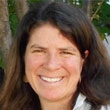
A Publication of Macalester’s
Environmental Studies Department
October 2016
![]()
Letter From the Chair
Dear Friends of Environmental Studies,
Last year was a great year for the ES Department. Of special note was that Roopali Phadke was promoted to Full Professor. For those of you who don’t know Roopali, she is a true interdisciplinary teacher/scholar with a PhD in Environmental Studies. She developed the department’s environmental leadership practicum and seminar that connects students with internships and has them reflect on these experiences. She also brings local practitioners and alumni to campus to interact with students. This duo of courses has become a central part of our curriculum and a model that other departments and colleges are interested in adopting. Besides teaching courses about environmental policy and politics, she has been instrumental in enhancing the College’s commitment to sustainability. She is currently the co-director of the College’s Environmental Sustainability Ambassadors program.
We had 14 students graduate in May 2016, the same number as in 2015, but down a few from our 5-year average (18). Of the 2015 graduates, 12 had disciplinary emphases and 2 had interdisciplinary emphases. Among the disciplinary emphases, 6 were from the social sciences and 5 from the sciences which is similar to 2014. A recent accounting from the Registrar’s office lists 49 majors and 23 minors with 18 of the majors slated to graduate in May 2017. I encourage you to look at the department’s website where you will be able to view the latest assessment report which includes information on the senior survey given to the 2016 graduates. We are having our department review this semester, and I want to say thanks to all of the alums that filled out the survey that was sent. We had a great response.
Once again we had a great graduating class that has now gone on to join a group of outstanding ES alums.
Dan Hornbach
Chair, Environmental Studies
![]()
Year in Photos
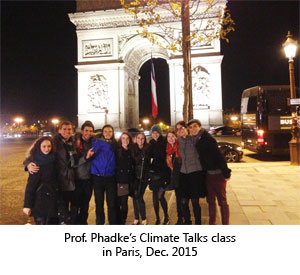 |
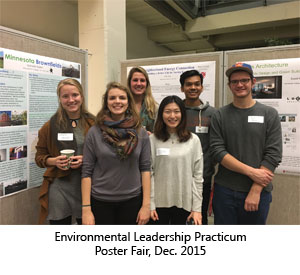 |
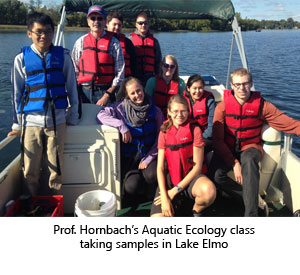 |
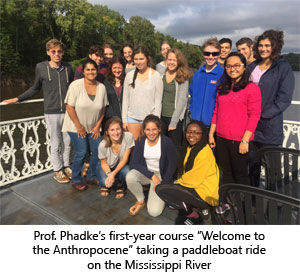 |
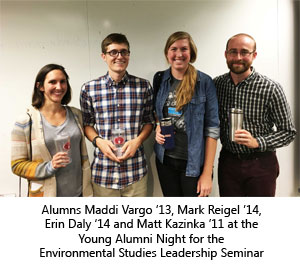 |
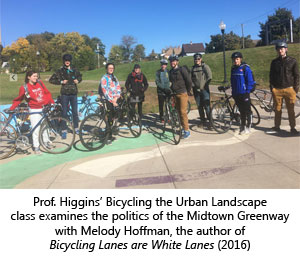 |
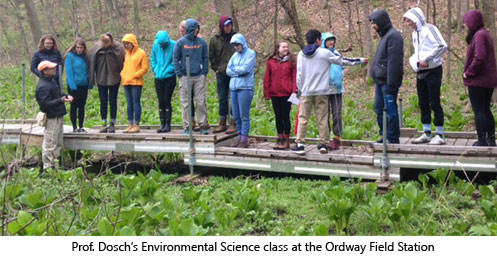 |
|
![]()
Sustainability Update
by Suzanne Savanick Hansen, Sustainability Manager
Welcome from the Sustainability Office! This year’s incoming class is the class of 2020. In 2020, we plan to be zero waste and have 30% real food in the dining hall. By the time this class comes back for their 5th year reunion, we plan to be climate neutral. When we set these dates, they seemed like a long time in the future. Now, the deadlines are getting closer. We will need help all of you to achieve them.
How are we doing on our goals? Last year we drafted up a revised Sustainability Plan. It’s waiting for final approval right now. This year we will focus on collecting data on our progress. Our six main areas are: zero waste, climate neutrality, food, sustainability education, urban sustainability, and health/wellness. Overall, we are making great progress toward zero waste due to the pig food program and campus-wide composting. The last 20% of our goal will be the most challenging as is no longer changing processes, but changing individual behavior. Our new Energy Manager in Facilities has helped identify many new energy efficiency projects that will help us get closer to our climate neutrality goal. The Real Food Challenge data collection has proved a challenge for us. If anyone is interested following up, the Sustainability Advisory Committee will be picking up this topic this year and could use some assistance.
This year our office will focus also on urban sustainability and using the campus as a living laboratory. We have a new living laboratory website with possible student projects listed as well as links to completed student projects. If any students are looking for a paper topic or student org project, check it out. Also, we have data available on the energy use of campus buildings as well as the energy generated from the new solar panels on Markim Hall. We also received a Green Ribbon School award from the Dept of Education last summer (www.macalester.edu/news/2016/04/macalester-named-a-green-ribbon-school-by-the-u-s-department-of-education/).
![]()
EnviroThursdays
There were 14 EnviroThursday presentations during the 2015-16 school with with over 344 in attendance.“
- “Discussion of Pope Francis’ Encyclical on Climate Change” by Jim Laine, Arnold H. Lowe Professor of Religious Studies, Macalester College, and Colleen Carpenter, Associate Professor of Theology, St. Catherine University
- “Community Solar: One Key Strategy Making Solar Available to All” by Michael Noble, Executive Director, Fresh Energy
- “The Past, Present, and Future of Drinking Water” by Jim Salzman, Professor of Environmental Law, Bren School of Environmental Science and Management, Univ. of California – Santa Barbara
- “A Tale of Two Cities: Dutch Elm Disease in Minneapolis and St. Paul in the 1970s” by David Soll, Assistant Professor, Watershed Institute, University of Wisconsin – Eau Claire
- “From Copper to Conservation: Relative Wild in Wrangell St. Elias National Park and Preserve” by Margot Higgins, Visiting Assistant Professor of Environmental History and Politics, Macalester College
- “Are We Using Up Our Water? Global Trends in Water Use and Water Availability” by Kate A Brauman, Lead Scientist, Global Water Initiative, Institute on the Environment at the University of Minnesota
- “Ecology and Geochemistry of Small Mammals – Deciphering Modern and Ancient Food Webs” by Andrew Haveles, Visiting Asst. Professor, Geology Dept., Macalester College
- “The Future is Back: Renovating a 100-year-old House to Net Energy by Stewart Herman, Homeowner and Retired Teacher
- “BioBiomimicry: Tapping Nature’s Genius for Today’s Challenges” by Diana Hammer, Life Scientist/Biomimicry Professional, US EPA Region 8 Montana Office, Helena, Montana
- “The Sun Doesn’t Always Shine and the Wind Doesn’t Always Blow: Managing Intermittent Renewable Energy on the Grid” by Jim Doyle, Professor, Physics and Astronomy Dept., Macalester College
- “Minnesota Pollution Control Agency and Environmental Justice” by Karen Solas, Environmental Justice Analyst, Minnesota Pollution Control Agency
- Honors Thesis – “Constituting and Contesting Development in Bolivia, Vietnam, and Turkey: Environment, Development, and Civil Society in the Neoliberal Era” by Laura Humes ’16
- Honors Thesis – “Lavoisier’s Legacy: The Dominance of Modern Water Quality Science” by Olivia Nelson ’16
- “Environmental Studies Senior Seminar Capstone Presentation”
Speakers: Senior Seminar Students
You can read more about these presentations at www.macalester.edu/academics/environmentalstudies/envirothursday and click on the Fall 2015 and Spring 2016 links. EnviroThursdays take place every Thursday during the school year in Olin-Rice 250 at 12 noon.
![]()
Environmental Studies Faculty News
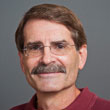 Prof. Dan Hornbach, Chair
Prof. Dan Hornbach, Chair
As I read my letter from last year, I realized the first four sentences also apply to this year! The past year was good one for the ES Department and me. I continue to chair the ES Department and the College’s Resources and Planning Committee. I find both of these tasks enjoyable because of the great interactions I have with faculty and staff colleagues. I also continue to teach Aquatic Ecology and Environmental Science. My 2015 Aquatic Ecology class carried out a research project as part of the class that resulted in a published paper – Hornbach, D., M Hove, M. Agata*, E. Arnold*, E. Cavazos*, C. Friedman*, K. Jay*, E. Johnson*, K. Johnson*, and A. Staudenmaier. 2016. Ecosystem Structure and Function in two branches of an eastern Minnesota trout stream. Journal of Freshwater Ecology (in press) (the names with asterisks are the students). Since global climate change is resulting in the warming of freshwater systems, cold water streams, such as those that house trout, are likely to be significantly impacted. We examined the differences in two streams, one that is an “ideal” trout stream and one that is a “marginal” trout stream to gather information on what may happen when warming transforms more “ideal” streams to “marginal” streams.
Kelly Macgregor and I, along with two researchers at the St. Anthony Falls Lab (SAFL) of the UMN, received a grant totaling $350,000 (of which $177,000 goes to Macalester) from the Minnesota Environment and Natural Resources Trust Fund. In the first summer of this grant we conducted fieldwork in the Minnesota and St. Croix Rivers looking at the impact of sediment on mussel communities. This past summer we took the mussels into the “lab” working at the St. Anthony Falls Lab in their outdoor stream lab and in flumes. Brooke Hunter returned for her second summer as a mussel researcher and Lea Davidson joined our team. In addition two students from the University of Minnesota and two students supported by the National Science Foundation’s Research Experiences for Undergraduates program participated in the fun. We had a great summer and are looking forward to another summer back in the field supported by this grant.
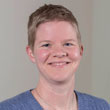 Prof. Louisa Bradtmiller
Prof. Louisa Bradtmiller
Louisa taught a new course in Fall 2015 on Modeling Earth Systems. The course, supported by an interdisciplinary education grant from NSF to the Science Education Resource Center, focused on helping students develop numerical and computer modeling skills to test hypothesis about a wide range of Earth system processes. The course enrolled students majoring in ES as well as all of the STEM majors at the college. In the past year Louisa participated in two international faculty seminars focused on sustainability. She attended an ACM seminar in Jordan in summer 2015 with Roopali Phadke (ES) and Dan Trudeau (Geography), and a Macalester seminar in Copenhagen in May/June 2016 with colleagues from across the college. Both trips have been valuable sources of material and experiences to inform her teaching and work at the college. Louisa was on sabbatical in Spring 2016, during which time she was at Macalester working on research, grant-writing, and course development.
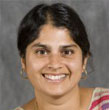 Prof. Roopali Phadke
Prof. Roopali Phadke
Roopali launched a new NSF funded project this year on the politics of rare earth mining. This past summer’s research focused on the Iron Range of Minnesota. The research team included Garrett Eichorn ’17 and Kaitlyn Lindaman ’18. She and Christie Manning also received an award from the Climate Adaptation Partnership Award from the University of Minnesota for their Ready & Resilient project.
Another highlight from 2016 was attending the Paris COP21 meeting with ten Macalester students and Suzanne Savanick Hansen. Students dispatched from Paris, as well as produced a range of publications about their research upon return. Roopali also taught and supervised the Sustainability Seminar which included summer collaborative research for students working in small groups with local partners. Several ES students participated in the Seminar.
In Fall 2016, Roopali is teaching a new first year course called “Welcome to the Anthropocene”. The course began by reading a set of fictional short stories called “Love in the Anthropocene”. Her FYC will be installing a gallery exhibit on Art of the Anthropocene in the DeWitt Wallace Library at the end of the semester.
Finally, Roopali, Louisa, Christie, Chris and Marianne all ventured to Copenhagen in May for a sustainability seminar. There they had the pleasure of visiting with Emma Anderson ’16, who now lives in Copenhagen and works for the DIS.
Roopali was honored to be promoted to Professor in 2016 and received the Educator of the Year award from the Macalester College Student Government.
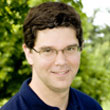 Prof. Chris Wells
Prof. Chris Wells
Chris is still in the thick of finishing a co-edited book with George Vrtis (Carleton College), Nature’s Crossroads: An Environmental History of the Twin Cities and Greater Minnesota, along with an edited documents collection, Unequal Burdens: Environmental Inequalities and the Pursuit of Environmental Justice in American History. He continues his work as the Associate Director of the Center for Scholarship and Teaching, where he directs Macalester’s Digital Liberal Arts initiative. Last spring, Chris taught the ES Senior Seminar, which acted as consultants for the local nonprofit Pollinate Minnesota. This year he is teaching US Urban Environmental History, Consumer Nation: 20th Century American Consumer Culture, and the ES Senior Seminar.
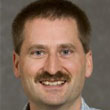 Prof. Jerald Dosch
Prof. Jerald Dosch
This fall Jerald is starting his 13th year at Macalester with continuing roles in both the Environmental Studies and Biology Departments as well as continuing to serve as Director of Macalester’s Ordway Field Station. Jerald completed his non-tenure track review last spring and was promoted to Associate Professor (NTT). His 2016-17 teaching schedule will include only Outdoor Environmental Education in Theory, Policy and Practice (co-taught with Ruthanne Kurth-Schai in Educational Studies), as he will be on sabbatical in the spring. Jerald again spent this past summer working at Ordway conducting ecological research and land management activities with a wonderful group of Macalester students and faculty. Along with department chair Dan Hornbach, Jerald also continued his involvement in the National Science Foundation (NSF) funded Ecological Research as Education Network (EREN). With EREN colleagues, Jerald published a paper on student-faculty collaborative research in the journal CUR Quarterly (Council on Undergraduate Research). Jerald and EREN colleagues also presented their research on bird-window collisions at the North American Ornithological Conference in Washington, DC. Two Macalester students helped conduct the bird-window collision research on campus and their data were pooled with those from colleagues across the country.
Prof. Margot Higgins
Having recently received her PhD in 2015, Margot has enjoyed her first academic position immensely. She was thrilled to be asked back to Macalester for a second year. Saint Paul has been a wonderful place to call home after living in the Bay Area for almost a decade. Margot has especially enjoyed exploring her new home by bicycle and connecting with people in the transportation planning and bicycle advocacy community. She even made it through the winter, as did the students enrolled in her (Winter) Bicycling the Urban Landscape Course. Last summer Margot traveled back to her research site in Alaska and extended the interviews from her dissertation. She recently completed a book proposal for a book that is tentatively titled “From Copper to Conservation: The Politics of Wilderness in Wrangell Saint-Elias National Park and Preserve”. Margot is currently teaching her bicycle history and politics class and U.S. Environmental History. This winter she will teach Bicycling the Urban Landscape, Americans and the Global Parks and Wilderness and an Environmental Activism for Policy Change course that she has been developing with the Center for Civic Engagement.
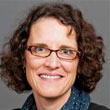
Prof. Christie Manning
This academic year Christie will teach Psychology of Sustainable Behavior in the fall and Environmental Classics in the spring. In addition to her two courses, Christie will continue in her role as EcoHouse faculty mentor, working with EcoHouse residents on several projects (which for now remain a mystery). Christie is in her final year as Associate Director of Educating Sustainability Ambassadors, a Macalester initiative to infuse sustainability throughout the curriculum and co-curricular student experience.
Christie spent much of the summer working with colleagues on a manuscript for ecoAmerica describing the psychological impacts of climate change. This has evolved into an edited book project called “Psychology and Climate Change: From Denial and Depression to Adaptation and Resilience” to be published in 2017. She is grateful to the many students who contributed to her research this summer, in particular psychology students Hannah Mangas and Delores Tang, and her stalwart State Fair Eco-Experience volunteers.
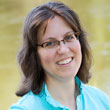 Prof. Marianne Milligan
Prof. Marianne Milligan
Marianne continues to teach in both the Linguistics Department and Environmental Studies. In June, she spent two weeks in Copenhagen with other Macalester faculty, staff and students looking at sustainability
in Denmark. During this time, she was able to gather pamphlets, pictures of signs and other primary sources of data for her students to analyze in the course, 100 Words for Snow: Language and Nature. Each year in that course, students analyze the discourse of “Greenspeak.”
